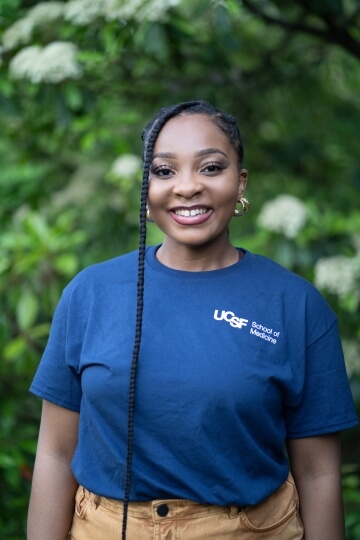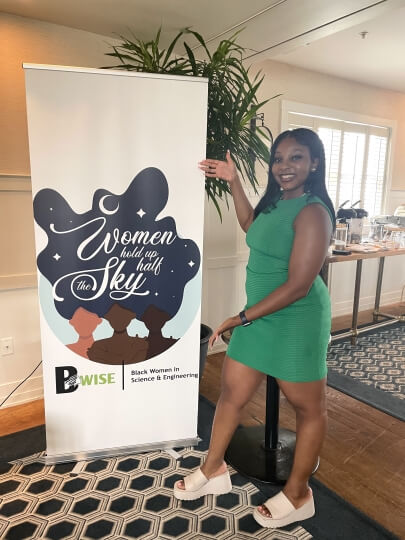Augusta Uwamanzu-Nna, S.B. '20 (Augusta Uwamanzu-Nna)
Augusta Uwamanzu-Nna, S.B. '20, wouldn’t be where she is without peer mentors. When her earliest peer mentor in high school got into Harvard, she was convinced to apply. Once here, student organizations such as the Harvard Society of Black Scientists and Engineers and Harvard Nigerian Students Association gave her a community as she studied bioengineering at Harvard John A. Paulson School of Engineering and Applied Sciences (SEAS). Fellow Harvard alumni even helped ease her transition to the University of California-San Francisco (UCSF), where she’s currently pursuing a combined M.D./Ph.D. in bioengineering through the Medical Scientist Training Program.
“I’m so grateful to have experienced the power of peer mentorship,” Uwamanzu-Nna said. “The fact that my near-peers were able to pursue science and medicine and help me demystify this space has made it possible for me.”
Since graduating, Uwamanzu-Nna has worked to help other people from communities underrepresented in STEM to get access to the same peer mentorship opportunities. That began when she founded and became the first director for the Translational Research for Untapped Science Talent (TRUST) Fellowship at Brigham & Women’s Hospital in Boston, which provided new research opportunities for Harvard undergraduates from historically underrepresented groups in science and medicine.
“During the COVID-19 pandemic, Black and brown communities were experiencing a lot of hardship,” Uwamanzu-Nna said. “So isn't it right to have more of us from these communities directly involved in the research?”
Uwamanzu-Nna first joined Brigham & Women’s as an undergraduate researcher in the lab of Dr. David Walt, Hansjörg Wyss Professor of Bioinspired Engineering and Professor of Pathology at Harvard Medical School. Her research in the Walt lab tied directly to her bioengineering capstone project at SEAS, but the lack of diversity in STEM wasn’t something she could avoid.
“At Harvard, as a research assistant in Dr. David Walt’s lab, I was the only Black person on my entire floor,” she said. “I find myself doing things surrounding mentorship and uplifting under-represented students because I do not want to be the only one.”
Uwamanzu-Nna’s interest in STEM dates back to her junior high days in Long Island, New York. She participated in regional conferences and was a finalist in the Science Talent Search, presenting on topics ranging from the regeneration cycle of flatworms to how to make cement more sustainable. These competitions helped pave the way for her to study bioengineering, but also became the bedrock of her passion for expanding access to STEM.
“My high school was predominantly Black, and we’d go to science competitions and be the only school with Black students,” she said. “I was a Science Talent Search finalist in my senior year, and I was the only Black person there. The competition assessed your overall ability to be a really good scientist, and the types of questions they asked had this implicit expectation that you had very rigorous science and research exposure across different disciplines. I tried my best, but I realized that there was no way, with the opportunities available to me, that I’d be able to equitably compete with kids who were doing research in labs that their parents ran.”
That experience didn’t deter Uwamanzu-Nna from applying to Harvard. She received multiple acceptance letters, and Harvard’s diverse student body ultimately swayed her over several other top-ranked schools.
“My Nigerian culture and aspects of my identity were and are so important to me,” she said. “I profoundly remember coming to Harvard, going to the Eleganza annual fashion show, and this group called Omo Naija performed. I didn’t know that an Afrobeats dance group was even a thing at Harvard. I ended up, of course, joining the dance team and was a member for all four years.”
Uwamanzu-Nna already wanted a career in medicine when she arrived at Harvard, and her introductory life sciences courses swung her to bioengineering as a concentration. She wrote a research proposal that explored using the mechanical properties of spider silk as inspiration for surgical sealants, and the combination of engineering and medicine proved to be a perfect fit.
“It was really hard and, quite frankly, I knew that four years at Harvard plus two years working at Brigham and Women’s Hospital would be enough,” she said. “But it was 100 percent the right choice. I was academically challenged to the point where I felt prepared going into medical school.”
Augusta Uwamanzu-Nna, S.B. ’20, at a Black Women in Science and Engineering event on Martha's Vineyard. (Augusta Uwamanzu-Nna)
While at Harvard, Uwamanzu-Nna sought other opportunities to diversify the community. She worked as a hometown recruiter for the Undergraduate Minority Recruitment Program, focusing on Long Island communities similar to her own.
“All of the drivers for my activities come from the same place,” she said. “The idea was not only to get more students to apply to Harvard, but to get them to consider that they could go to a school like Harvard. New York is a really big place that Harvard students come from, but typically only from certain feeder schools. I wanted to make a concerted effort to go to schools in Long Island where Harvard doesn’t typically recruit from.”
Uwamanzu-Nna knows how big an impact high school outreach can have. She attended her first United State of Women Summit, hosted by then-First Lady Michelle Obama, as a high school student when she met Erica Jefferson, founder of Black Women in Science and Engineering (BWISE). The two hit it off and stayed in touch throughout Uwamanzu-Nna’s time at Harvard, collaborating on several projects such as the Black Women in STEM Brunch at Harvard. She then became Jefferson’s chief of staff at BWISE in November 2021, staying in that role for nine months before heading to UCSF.
“Of course I wanted to be involved with Black Women in Science and Engineering, because I am a Black woman in science and engineering,” Uwamanzu-Nna said. “Her (Jefferson’s) focus at the time was elevating the careerss of mid- to senior-level Black women, and we wanted to expand BWISE’s reach to people like me, early-career professionals who wanted more mentorship in the science and technology space.”
Though she’s now transitioned to an informal role at BWISE, Uwamanzu-Nna hopes to bring the organization to San Francisco, an ideal location given how many of its residents work in science and technology. Mentorship has meant so much to her, and she wants to do everything she can to share it with others.
“Having someone who really, deeply believes in you is so, so important,” she said. “I’m in an M.D./Ph.D. program in part because of my peer mentors, and I just want to share that with people.”
Press Contact
Matt Goisman | mgoisman@g.harvard.edu

